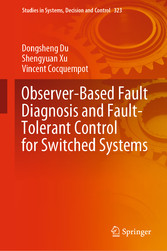Suche
Lesesoftware
Info / Kontakt

Observer-Based Fault Diagnosis and Fault-Tolerant Control for Switched Systems
von: Dongsheng Du, Shengyuan Xu, Vincent Cocquempot
Springer-Verlag, 2020
ISBN: 9789811590733 , 280 Seiten
Format: PDF
Kopierschutz: Wasserzeichen



Preis: 96,29 EUR
eBook anfordern 
This book focuses on the fault diagnosis observer design for the switched system. Model-based fault diagnosis and fault tolerant control are one of the most popular research directions in recent decades. It contains eight chapters. Every chapter is independent in the method of observer design, but all chapters are around the same topic. Besides, in each chapter, the model description and theoretical results are firstly provided, then some practical application examples are illustrated to prove the obtained results. The advanced theoretical methodologies will benefit researchers or engineers in the area of safety engineering and the arrangement of the structure will help the readers to understand the content easily.
Dongsheng Du received the B.Sc. degree in applied mathematics, M.Sc. degree in control theory from Qufu Normal University, Qufu, China, in 2003 and 2006, and the Ph.D. in control theory and engineering from Nanjing University of Aeronautics and Astronautics, Nanjing, China, in 2012.
From 2008 to 2013, he was a Lecturer with the School of Science, Huaihai Institute of Technology. From 2015, he was an Associate Professor with the Faculty of Automation, Huaiyin Institute of Technology. From November 2016 to November 2017, he was a Visiting Scholar with Centre de Recherche en Informatique, Signal et Automatique de Lille, Polytech'Lille, France. His current research interests include fault diagnosis, fault tolerant control and switched system. Currently, he has published more than 30 papers indexed by SCI and one book in Springer Verlag.
Shengyuan Xu received the B.Sc. degree from Hangzhou Normal University, China, in 1990, the M.Sc. degree from Qufu Normal University, China, in 1996, and the Ph.D. degree from the Nanjing University of Science and Technology, China, 1999. From 1999 to 2000, he was a Research Associate with the Department of Mechanical Engineering, The University of Hong Kong, Hong Kong. From 2000 to 2001, he was a Postdoctoral Researcher with CESAME, University catholique de Louvain, Belgium. From 2001 to 2002, he was a Postdoctoral Researcher with the Department of Electrical and Computer Engineering, University of Alberta, Canada. Since 2002, he has been a Professor with the School of Automation, Nanjing University of Science and Technology. His current research interests include robust filtering and control, singular systems, time-delay systems, neural networks, multidimensional systems and nonlinear systems. He is a member of the Editorial Boards of the Transactions of the Institute of Measurement and Control and the Journal of the Franklin Institute. He was a recipient of the National Excellent Doctoral Dissertation Award from the Ministry of Education of China in 2002. He received a grant from the National Science Foundation for Distinguished Young Scholars of China in 2006 and a Cheung Kong Professorship from the Ministry of Education of China in 2008.
Vincent Cocquempot was born in France, in 1966. He received the Ph.D. degree in automatic control from the Lille University of Sciences and Technologies, France, in 1993. He is currently a Professor in automatic control and computer science with the IUTA (Technological Institute), Lille University, and a Researcher with CRIStAL UMR CNRS 9189 (Research Center in Computer Science, Signal and Automatic Control of Lille), University of Lille, France. His research interests include robust on-line fault diagnosis for uncertain dynamical nonlinear systems, fault detection and isolation, and fault tolerant control for hybrid dynamical systems.
This book focuses on the fault diagnosis observer design for the switched system. Model-based fault diagnosis and fault tolerant control are one of the most popular research directions in recent decades. It contains eight chapters. Every chapter is independent in the method of observer design, but all chapters are around the same topic. Besides, in each chapter, the model description and theoretical results are firstly provided, then some practical application examples are illustrated to prove the obtained results. The advanced theoretical methodologies will benefit researchers or engineers in the area of safety engineering and the arrangement of the structure will help the readers to understand the content easily.




